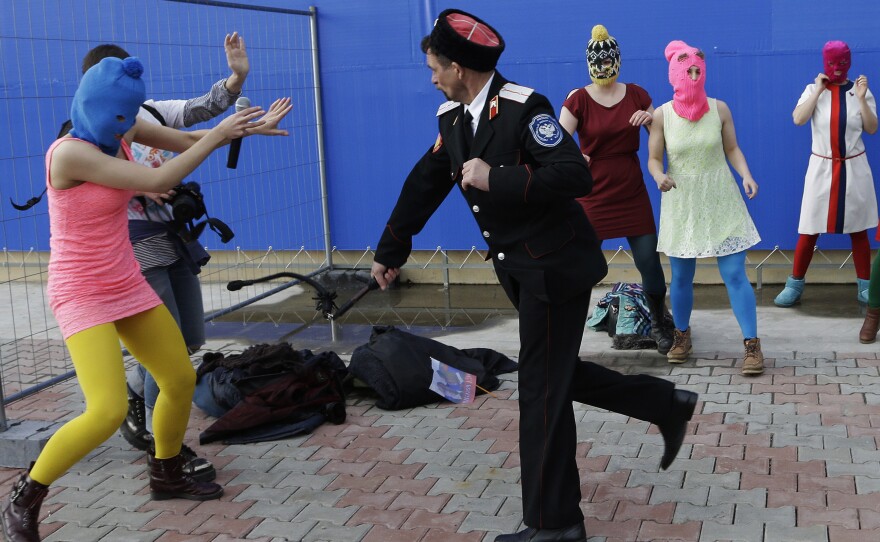The contrast couldn't have been greater: the protest band Pussy Riot in colorful ski masks and mini dresses, attempting to film a segment for a new video on Sochi's waterfront; and Cossacks in traditional uniform with black sheepskin hats and riding boots, patrolling Sochi streets as part of security for the Olympics.
The Cossacks, trying to enforce a government ban on protests, knocked band member Nadezhda Tolokonnikova to the ground, lashed her with a horse whip, and roughed up other musicians.
There was no pretext that the band was violating any laws, and there were no charges filed against the Cossack attackers.
The band members did get their revenge, though: The Cossack attack figures prominently in their latest video, of a song called "Putin Will Teach You How To Love the Motherland."
Actually, Cossacks are part of a long tradition in Russian music, but mostly in the form of rousing traditional folk songs. Throughout most of the Soviet period, colorful song and dance troupes like the Kuban Cossack Choir were the only expression of Cossack identity that was permitted.

After the revolution in 1917, Cossacks fought on the losing side in the civil war, and they were harshly repressed by the Soviets. It was a far cry from the Cossacks' origins as marauders and traders, living on the frontier lands of southern Russia and what is now Ukraine, almost like the cowboys of the Wild West.
Russian czars, from Peter the Great to Catherine the Great, brought the Cossacks under their control, explains Brian Boeck, a history professor at De Paul University, who specializes in the Cossacks.
"They became border guards and body guards," Boeck says. "They became mountain men and mounted patrolmen. They were tools of empire. Anywhere that the Russian Empire needed to fight, they would send the Cossacks."
Beck says the Cossacks began reviving themselves as a community almost as soon as the Soviet Union collapsed.
Nikolai Kuts, who is Ataman, or leader, of the Central Sochi Cossack Society, says Cossacks have already established eight cadet colleges, where children can learn about their heritage and prepare for careers in the military or the security services.
"Now, young school children start learning about Cossacks from the seventh grade," Kuts says. "Children can already think of their future service in the army. I am proud that my Cossacks of the central district in Sochi are in the army and also in the presidential guard horse unit."
Kuts says the regional governor called upon his Cossacks to serve in Sochi alongside police as unarmed support staff with useful local knowledge.
Kuts says that Cossack identity is inextricably linked to Russian Orthodox Christianity, and that a Cossack soul can only be inherited from Cossack ancestors.
After this interview, Kuts took part in the attack on Pussy Riot and later declined NPR's request for comment.
Boeck says the image of the Cossack in Russia is very different from the image outside the country, where Cossacks are associated with leading pogroms against Jews and other minority groups.
"When you tell someone in New York 'Cossack,' right away they think of violence and wildness, fire and destruction and whips, and men on horseback wreaking havoc," he says. "When you tell someone in Russia, 'Cossack,' they're more likely to think of a kind of proud heritage."
The image of the Russian frontiersman and patriotic fighter is one that President Vladimir Putin and the Cossacks themselves are hoping to cultivate, Boeck says. Both images are playing to a kind of selective memory about Cossack history.
Copyright 2021 NPR. To see more, visit https://www.npr.org. 9(MDAzMjM2NDYzMDEyMzc1Njk5NjAxNzY3OQ001))






